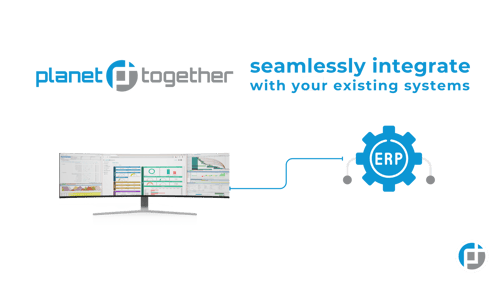Balancing Budget and Quality: A Strategic Imperative for Purchasing Managers in Medical Manufacturing
In medical manufacturing industry, Purchasing Managers are navigating one of the most challenging balancing acts in their field: delivering top-quality components and materials while staying within increasingly constrained budgets. With regulatory demands, supply chain disruptions, and heightened expectations for product safety and efficacy, finding the sweet spot between cost and quality has never been more critical—or more complex.
Achieving this balance requires more than traditional procurement strategies. It demands sophisticated planning, data integration, and real-time decision-making tools that can harmonize supplier relationships, inventory management, and production scheduling. Solutions like PlanetTogether Advanced Planning and Scheduling (APS), when integrated with leading enterprise platforms like SAP, Oracle, Microsoft, Kinaxis, or Aveva, provide Purchasing Managers with the necessary intelligence and agility to succeed in this dynamic landscape.
The Critical Importance of Quality in Medical Manufacturing
Unlike other industries, quality is not negotiable in medical manufacturing. A single defect can lead to regulatory penalties, product recalls, or worse—risk to patient safety. Suppliers must meet rigorous standards for material quality, consistency, and compliance with certifications like ISO 13485 and FDA regulations.
Yet, as material costs rise and budgetary pressures tighten, there is a real temptation to seek lower-cost alternatives. Without a robust system to evaluate total cost of ownership—including inspection rates, failure risks, and supplier performance—organizations may inadvertently compromise their quality standards, leading to downstream costs far exceeding any initial savings.
Strategic procurement, therefore, requires tools that allow Purchasing Managers to evaluate not just price, but supplier reliability, quality trends, lead times, and risk exposure.
The Rising Complexity of Procurement Management
Several trends are making procurement in medical manufacturing more complex:
Globalized Supply Chains: Sourcing from international vendors introduces variability in lead times, regulatory standards, and political risk.
Shorter Product Lifecycles: With innovations in medical technology accelerating, components often need to be sourced quickly to keep up with R&D and market demands.
Regulatory Scrutiny: Compliance is mandatory, not optional. Suppliers must prove quality processes at every stage.
Economic Pressures: Budget cuts and margin pressures force Purchasing Managers to seek cost efficiencies without jeopardizing compliance or product integrity.
In this environment, manual procurement planning simply cannot keep pace.

How Integrated APS Systems Enable Better Decision-Making
This is where solutions like PlanetTogether APS—especially when integrated with enterprise platforms such as SAP, Oracle, Microsoft Dynamics, Kinaxis RapidResponse, or Aveva's industrial software—prove indispensable.
An integrated APS solution allows Purchasing Managers to:
Model and compare supplier scenarios based on real-time operational data.
Forecast material needs dynamically based on changing production schedules.
Adjust procurement strategies proactively when disruptions occur.
Optimize order quantities to reduce holding costs without risking stockouts.
Analyze supplier performance trends to align quality outcomes with budget expectations.
Rather than relying on backward-looking reports, integrated APS solutions provide forward-looking insights. They simulate how supplier choices impact the entire production plan, inventory levels, and customer commitments.

Practical Applications: From Theory to Reality
Let's consider some practical examples of how Purchasing Managers in medical manufacturing can use an integrated PlanetTogether environment:
Supplier Risk Assessment and Diversification
Suppose a key supplier for surgical-grade polymer tubing shows signs of delayed shipments. By leveraging PlanetTogether integrated with SAP or Oracle, Purchasing Managers can simulate the impact of a switch to alternative suppliers. The system can automatically adjust scheduling, labor allocation, and shipping estimates, allowing for a comprehensive view of risks versus costs before making a decision.
Dynamic Safety Stock Management
In medical manufacturing, maintaining too much safety stock can be almost as problematic as running out. PlanetTogether with Kinaxis integration enables dynamic safety stock calculations, balancing inventory carrying costs with production reliability. Purchasing Managers gain visibility into material requirements at a granular level, ensuring budgets are not wasted on excess stock without risking production delays.
Procurement Based on Real-Time Production Schedules
By integrating PlanetTogether with Microsoft Dynamics 365, real-time production changes—such as an urgent order for a specialized catheter—can automatically trigger adjusted material purchasing requirements. This minimizes manual work, reduces over-ordering, and ensures that only necessary, high-quality materials are ordered in response to actual demand.
Supplier Quality Performance Tracking
With Aveva's industrial intelligence tools connected to PlanetTogether, it becomes possible to correlate supplier performance with production outcomes. Purchasing Managers can track if lower-cost suppliers are increasing the defect rate at final assembly and calculate the true cost impact—not just the invoice price—of those materials.

Best Practices for Balancing Budget and Quality
To truly optimize purchasing decisions without compromising quality, medical manufacturing organizations should adopt the following best practices:
Total Cost of Ownership (TCO) Analysis
Rather than focusing solely on unit price, evaluate the complete lifecycle cost, including:
Defect rates
Inspection and testing costs
Warranty claims
Regulatory compliance risks
Supplier reliability metrics
Supplier Scorecarding
Develop detailed scorecards that measure suppliers across multiple dimensions:
Cost adherence
On-time delivery rates
Compliance records
Quality performance
An integrated APS platform can automatically feed these scorecards with real-time data.
Strategic Supplier Collaboration
Work collaboratively with high-quality suppliers to find cost-saving innovations, such as:
Leaner packaging
Process optimizations
Volume discounts
Systems like PlanetTogether, especially when connected to SAP or Oracle SRM (Supplier Relationship Management) modules, facilitate transparent supplier communication and collaboration.
Predictive Analytics and Scenario Planning
Use predictive analytics to model potential disruptions, cost changes, and supplier failures before they happen. With PlanetTogether’s scenario simulation capabilities, Purchasing Managers can preemptively shift sourcing strategies.
Align Procurement with Production Planning
Purchasing and production must be integrated. Changes in production schedules must instantly reflect in procurement plans to avoid costly mismatches. Integrating PlanetTogether with ERP and MES platforms like Aveva ensures seamless coordination between departments.
In medical manufacturing, quality and budget will always be intertwined. However, the old dichotomy—where higher quality always meant higher costs—is no longer absolute. Through intelligent planning, better supplier management, and advanced technology integration, Purchasing Managers can truly balance these objectives.
By integrating PlanetTogether APS with platforms like SAP, Oracle, Microsoft, Kinaxis, or Aveva, medical manufacturers gain a centralized, dynamic, and predictive procurement environment. This empowers Purchasing Managers not only to meet immediate operational needs but also to build a more resilient, cost-efficient, and quality-driven supply chain for the future.
Are you ready to take your manufacturing operations to the next level? Contact us today to learn more about how PlanetTogether can help you achieve your goals and drive success in your industry.
Topics: PlanetTogether Software, Integrating PlanetTogether, Medical Manufacturing, Dynamic Safety Stock Management, Model and Compare Supplier Scenarios, Forecast Material Needs Dynamically, Optimize Order Quantities, Supplier Risk Assessment and Diversification, Supplier Quality Performance Tracking





















LEAVE A COMMENT